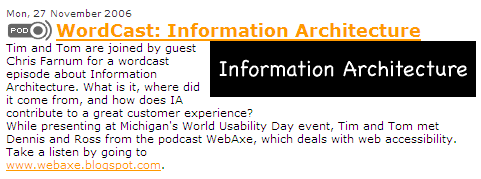Intro to Information Architecture -- Reflections on the Different Roles We Can Play
 This podcast from Tim and Tom's Design Critique is a good introduction to Information Architecture. Information architecture involves making content findable, usually in reference to websites. How intuitive is it for users to locate what they're trying to find or do?
This podcast from Tim and Tom's Design Critique is a good introduction to Information Architecture. Information architecture involves making content findable, usually in reference to websites. How intuitive is it for users to locate what they're trying to find or do?
The role of the information architect is to organize information such that the user has no trouble finding exactly what he or she desires, particularly in situations where there are hundreds of pages. The discipline's roots began with library science and taxonomy, but the term "information architect" is relatively new — the podcast mentions the year 2000 as the time when the term (and professional designation) was introduced.
In the podcast, guest expert Chris Farnum talked about the different roles people play on teams. Some specialize in graphic design, others in usability, others in coding, others in information architecture, others in content, and so forth. Some are able to play several of these roles expertly, and a select few can do them all.
My Reflections
The idea of playing multiple roles on a team struck me the most. As writers, just because we can write, we often think Writing is our vocation. Excessive praise can lull us into thinking that writing is our niche, our area of focus. This mindset can be damaging — it can pigeonhole us into believing that writing is the only thing we can do, the only thing we should do.
In reality, good writing skills are often evidence of a keen mind capable of excelling at a number of different disciplines, from law to medicine to science. Just because we can write, we shouldn't limit ourselves into thinking our calling is a "writer." We can do a lot of different things well.
Early on in college I received such positive praise from my essays and creative writing that I felt writing was my calling. Years later I began to reflect that writing was only one of my many skills, and that I could have gone in a number of different directions and equally excelled. (Well, maybe not mathematics.)
I still love to write, but I now recognize that writing isn't my only strength.


